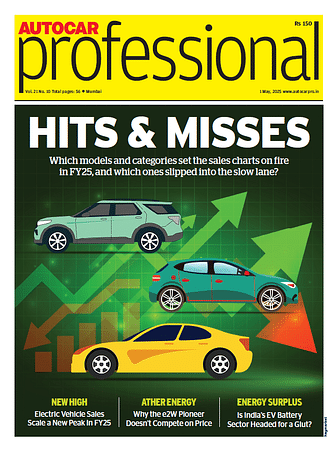‘We’re Being Careful’: Tesla CFO Vaibhav Taneja on Company’s Cautious India Entry
Tesla's India entry faces tariff hurdles and no immediate plans for local manufacturing. CFO reiterated interest, but the timeline remains unclear as the government has yet to resolve duty concerns.
Tesla’s long-anticipated entry into the Indian market remains uncertain, as high import duties are a significant deterrent. Tesla CFO Vaibhav Taneja acknowledged the challenges to analysts after the company’s Q1 2025 earnings on Wednesday, stating that Tesla is still working towards entering India but remains cautious about the timing due to the country’s steep tariff regime.
• Taneja calls India a “hard market” due to 100% import tariffs
• Tesla is taking a cautious approach, no timeline confirmed
• No additional manufacturing plans until sales near 3 million units
• New low-cost variants in June 2025 may influence India's strategy
• Musk to visit India in 2025 after talks with PM Modi
• Policy clarity on EV import duty is still awaited
According to Taneja, the core challenge lies in India’s complex and steep tax regime. “Any car we send into India is subject to a 70% import tariff, plus an additional 30% luxury tax,” he said, noting that this makes Tesla vehicles effectively 100% more expensive than in other markets. “This creates a lot of anxiety for customers,” Taneja explained, “because they feel they’re paying too much for the car — and importantly, that money isn’t coming to Tesla. It’s going to the local government.”
Taneja emphasized that India is “a very hard market” not just because of tariffs, but because of the overall import structure. He said Tesla is “being very careful” about timing its entry. “We’re trying to figure out when the right time is,” he said, adding that “we are working on it.”
Despite the challenges, Taneja reiterated Tesla’s long-term interest in the country. “India is a great market to enter,” he said. “It has a large middle class — the segment we want to tap into. But the current structure creates tension, and we’re trying to work around those challenges.”
India levies up to 100% import duty on fully built cars, a policy that has long deterred premium electric vehicle makers from launching products in the market without local manufacturing commitments.
Jay Kale, Executive Vice President at Elara Capital, offered additional perspective on Tesla’s strategy, suggesting that production capacity expansion globally is unlikely in the near term. “They mentioned that no new manufacturing lines will be invested until they reach closer to 3 million vehicle sales, which kind of puts to rest any immediate plans of them announcing production capacity expansion in India,” Kale said. “While they would like to enter India, it will all depend on the government lowering import duty (without any immediate commitment of capacity expansion, in our view).”
Industry observers believe that Tesla’s move will also be influenced by the launch of its new lower-priced variants, expected around June 2025. “The launches of the cheaper variants will be interesting to monitor from June 2025, as that will decide at what price points they will enter India (if import duty is lowered),” Kale added.
Despite active engagement between Tesla and Indian policymakers over the past year, including discussions around potential investment and policy incentives, there has been no official confirmation of a timeline for market entry or local assembly plans.
The Indian government has been working on a new electric vehicle policy that could reduce import duties in exchange for investment commitments. However, local manufacturing is not foreseen, at least in the near term, and Tesla appears to be taking a wait-and-watch approach without clarity on the tariff terms.
As per the news report in Reuters in February 2025, Tesla finalized a lease agreement for a 4,003-square-foot showroom in Mumbai's Bandra Kurla Complex (BKC), a prominent business and retail hub. The five-year lease commenced on February 16, 2025, with an initial annual rent of approximately $446,000, increasing by 5% annually.
Additionally, Tesla has reportedly secured a location in New Delhi's Aerocity, a commercial area near Indira Gandhi International Airport, for another showroom. Both showrooms are expected to span around 5,000 square feet and will be directly operated by Tesla, focusing on sales of imported electric vehicles. Tesla has posted job listings for various mid-level positions in India, including sales, customer support, and operations.
In fact, Elon Musk last week confirmed plans to visit India later this year, following a conversation with Prime Minister Narendra Modi on April 18, 2025.
On a social media platform X, Musk said, “It was an honour to speak with PM Modi. I am looking forward to visiting India later this year!"
Musk and Modi's conversation touched upon a range of topics, including technological innovation and bilateral cooperation, but there was no mention of Tesla’s entry into India.
In his own post, PM Modi noted, “I spoke to @elonmusk and talked about various issues, including the topics we covered during our meeting in Washington, D.C., earlier this year. We discussed the immense potential for collaboration in technology and innovation. India remains committed to advancing our partnerships with the U.S. in these domains.”
For now, Tesla’s India entry remains a matter of “when,” not “if,” hinging largely on policy shifts and the economics of localization.
RELATED ARTICLES
Endurance Technologies Reports Robust FY25 Performance with ₹1,167 Cr Revenue Growth
The company records a consolidated revenue of ₹11,560.8 crore in FY25, marking a 12.9% year-on-year increase driven by s...
Earnings Preview: Lower Volumes to Dent Hyundai India’s Q4 Numbers
The automaker’s vehicle dispatches, which were down marginally by 1.1% year-on-year, and higher discounts are expected t...
Tube Investments of India Reports Q4 PBT of ₹880 Crore, Recommends ₹1.50 Final Dividend
The company posted stable annual performance with ₹7,893 crore revenue while recognizing a significant ₹569 crore fair v...





 By Ketan Thakkar & Darshan Nakhwa
By Ketan Thakkar & Darshan Nakhwa
 23 Apr 2025
23 Apr 2025
 2550 Views
2550 Views





 Sarthak Mahajan
Sarthak Mahajan




